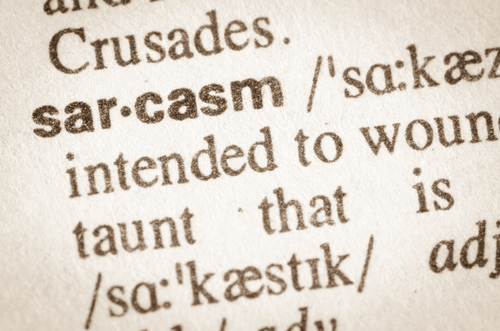The Unexpected Creative Effect of Sarcasm
This is one of our free-to-access content pieces. To gain access to all Ideas for Leaders content please Log In Here or if you are not already a Subscriber then Subscribe Here.

Sarcasm in the workplace may not be as destructive as once thought. New research shows that expressing or receiving sarcasm can spark creativity through abstract thinking — especially if the sarcasm is directed at or received from a trusted person
Is sarcasm in the workplace as destructive as usually assumed? While sarcasm — in which people express one thing by saying the exact opposite — is rampant in organizations, most leadership and communication books urge people to avoid sarcastic remarks, which are considered a negative form of communication.
However, a team of researchers argue that sarcasm can have psychological and organizational benefits that have been overlooked. The team, from INSEAD, Harvard Business School and Columbia Business School, used a series of experiments to demonstrate that sarcasm can create conflict but also spur creativity by facilitating abstract thinking.
The first two experiments examined the impact of expressing and receiving sarcastic remarks on one’s sense of conflict. In study 1, the researchers used a simulated conversation based on cartoons with two people speaking. One of the two bubbles in the cartoon was left blank, and participants filled in that bubble. Some participants (in the expressing sarcasm condition group) were asked to fill in a sarcastic reply to the talking figure in the cartoon. Others (receiving sarcasm condition) were told the cartoon speaker was being sarcastic, and asked to reply with the first thought that came to mind. Other participants replied sincerely (expressing sincerity condition), or were told the speaker was being sincere (receiving sincerity condition), or simply told to reply without any other information given (control condition).
Participants then completed a creative task, were asked about the presence of conflict in their simulated conversations, and rated their mood during the conversation.
The second experiment was similar to the first except that the researchers used recalled sarcastic or sincere conversations (participants were asked to recall expressing or receiving sarcastic or sincere comments), which were followed by a different creative task but the same conflict and mood questions.
The first two experiments showed to some extent that sarcasm can increase a sense of conflict (compared to neutral conversations at least – the results were less clear whether sincere conversations lead to less conflict). What was unequivocal, however, was support of the central thesis that sarcasm in conversations leads to more creativity.
How sarcasm leads to creativity was explored in study 3, which used recalled sarcastic, sincere or neutral conversations and then tested the participants on their abstract thinking in addition to tests of conflict and mood. The study found that participants in the expressing sarcastic conversations were also the most abstract-thinking participants (according to the post-conversation test) compared to participants in the other conversations, notably the receiving sincerity and control conversations. The participants in the receiving sarcastic conversations also displayed more abstract thinking after the simulated conversation than participants in the other conversations (with the exception, of course, of the expressing sarcastic participants).
Mediation analyses of the data — which examine the cause and effect factors of relationships between variables — confirmed that expressing or receiving sarcastic remarks increases creativity through abstract thinking.
The final study added the trust factor to the equation. The experiment used the same cartoon conversation as in experiment 1, only this time the participants were asked to imagine that the other person in the conversation was someone they either trusted or distrusted to a great extent. The researchers then applied creativity tasks and conflict questionnaires similar to the earlier experiments. The results showed that trust was an important factor in reducing the conflict inherent in sarcastic remarks.
This last result is significant. By revealing the positive impact of sarcasm on creativity, the researchers demonstrated that creativity is a double-edged sword: a positive influence on creativity but negative because it increases the conflict level in the relationship. If the receiver or expresser of sarcasm is a trusted person, however, the negative edge of the sword is dulled.
Another element of all the experiments is that the effects described above appeared for all types of sarcasm, from humorous sarcastic banter to angry critical sarcasm.
Leadership theorists have already revealed the power of humour in improving relationships and work outcomes. Sarcasm, however, was considered a negative type of humour that undermined relationships and reduced outcomes. The new research reveals that sarcasm can be a valuable tool for creativity, although it is a double-edged sword because it can also raise the conflict level in the relationship.
Leaders who have developed a trust-based relationship with their employees (which reduces the conflict impact of sarcasm) could try to use sarcasm in their conversations to spark the creativity that the researchers predict. Note that the creative impact of sarcasm applies to both recipients and expressers, meaning that sarcastic leaders themselves will become more creative as they develop their sense of sarcasm.

Ideas for Leaders is a free-to-access site. If you enjoy our content and find it valuable, please consider subscribing to our Developing Leaders Quarterly publication, this presents academic, business and consultant perspectives on leadership issues in a beautifully produced, small volume delivered to your desk four times a year.

For the less than the price of a coffee a week you can read over 650 summaries of research that cost universities over $1 billion to produce.
Use our Ideas to:
Speak to us on how else you can leverage this content to benefit your organization. info@ideasforleaders.com